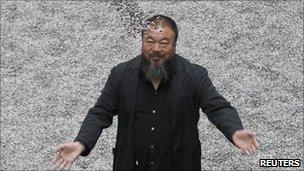Concern mounts over missing Chinese artist Ai Weiwei
- Published

Foreign governments are calling for the immediate release of Chinese artist Ai Weiwei, who was detained by security officials at Beijing airport on Sunday.
The Chinese authorities have said nothing about his arrest while boarding a Hong Kong flight, even to his family.
The United States, Britain and Germany have all expressed their concern.
The US embassy in Beijing said the activist's detention was "inconsistent with the fundamental freedoms and human rights of all Chinese citizens".
Human rights groups say it is part of a crackdown on dissent in China following protests in the Middle East and North Africa.
They believe Beijing is keen to prevent similar scenes in China.
Human Rights Watch said up to 25 lawyers, activists and bloggers had been either detained, arrested or had disappeared. Dozens more had been subjected to harassment, it said.
'Causing trouble'
In a statement issued on Tuesday, Markus Ederer, the European Union's ambassador in China, said: "[We are] concerned by the increasing use of arbitrary detention against human rights defenders, lawyers and activists in China."
"We call on the Chinese authorities to refrain from using arbitrary detention under any circumstances."
Beijing lawyer Liu Xiaoyan told the BBC he had been summoned by the police and held for 10 hours last Saturday after posting online notes asking about a missing Shanghai lawyer.
"They accused me of causing trouble by discussing the missing lawyer," he said.
Mr Liu, a friend of the artist, said by law the police should by now have either charged or released Mr Ai.
Ai Weiwei is an internationally renowned artist. He currently has an exhibition at the Tate Modern gallery in London, displaying 100 million porcelain objects that look like sunflower seeds.
The 53-year-old is also one of the Chinese government's fiercest critics, complaining about a lack of basic rights and freedoms - often incorporating these political themes into his work.
- Published4 April 2011
- Published12 January 2011
- Published8 November 2010
- Published6 November 2010
- Published4 November 2010
- Published15 October 2010